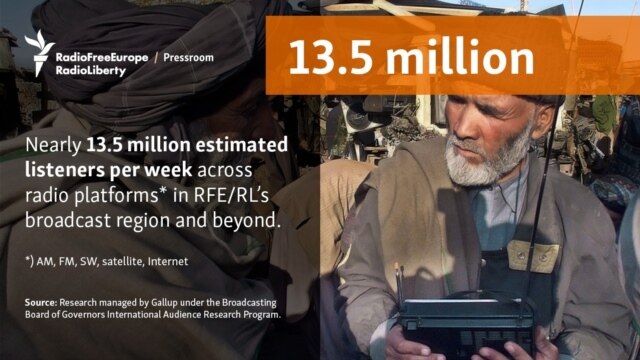Radio Still Vital For Many RFE/RL Audiences
On UNESCO World Radio Day on Feb. 13, RFE/RL audiences gave the platform a resounding endorsement as a powerful medium and an indispensable source of information and news.

WASHINGTON — On UNESCO World Radio Day on Feb. 13, RFE/RL audiences gave the platform a resounding endorsement as a powerful medium and an indispensable source of information and news.
In an era when television and online media are increasingly dominant, radio continues to play a vital role for half of RFE/RL’s 27 million-strong weekly audience. When RFE/RL asked listeners in Iran, Pakistan, Afghanistan, Moldova, and Georgia what radio means to them, hundreds of calls, emails, social media messages and SMSs flooded in to its broadcast services.
A female listener of Radio Mashaal, which has 800,000 Pashto-speaking listeners every week in Pakistan’s tribal areas along the border with Afghanistan, wrote, “Radio Mashaal is like my mother, who gave me knowledge and awareness and taught me humanity.” A listener of RFE/RL’s Afghan Service wrote, “I congratulate all the journalists at Radio Azadi for upholding its name for 15 years by delivering programs that contribute to our freedom.” One of the 2 million weekly listeners to Radio Farda, RFE/RL’s service Iran, said, “It has been 10 years now that Radio Farda has been my companion,” adding, “it is the only place [where] people are allowed to talk easily and freely… a democratic soul guides Radio Farda.”
A Georgian sociologist who listens to Radio Tavisupleba said, “Radio is alive and we need it,” while a civil servant in Moldova wrote of Radio Europa Libera that it’s “the only place I can get something besides lies and propaganda.”
Remarking on the enduring relevance of radio in Central Asia, Umed Babakhanov, the founder of Tajikistan’s independent news agency Asia-Plus, told an RFE/RL podcast that “Since Soviet times radio has always been the most important mass media” in the agrarian societies of Central Asia, where “people in the field cannot watch TV, but they can listen to the radio all day long.” He said the role of foreign broadcasters is as important as it was during Soviet era, since it’s “almost impossible” to express criticism of the government on domestic-run platforms.
RFE/RL is also marking the one-year anniversary of Radio Donbas.Realities, a live, daily one-hour FM broadcast that brings coverage of local and international news stories either ignored or misrepresented by pro-Kremlin media – about infrastructure, education, and the war – to more than 15 cities in Ukraine’s war-torn eastern regions of Donetsk and Luhansk.
RFE/RL is a private, independent international news organization whose programs — radio, internet, television, and mobile — reach 27 million people in 26 languages and 23 countries, including Russia, Ukraine, Iran, Afghanistan, Pakistan, the republics of Central Asia and the Caucasus, and the Baltic states. With more than 900 million page views on its websites and 300 million video views on YouTube, RFE/RL is reaching audiences on the media platforms they prefer. Visit currenttime.tv to see the new Russian language digital network led by RFE/RL in cooperation with Voice of America.